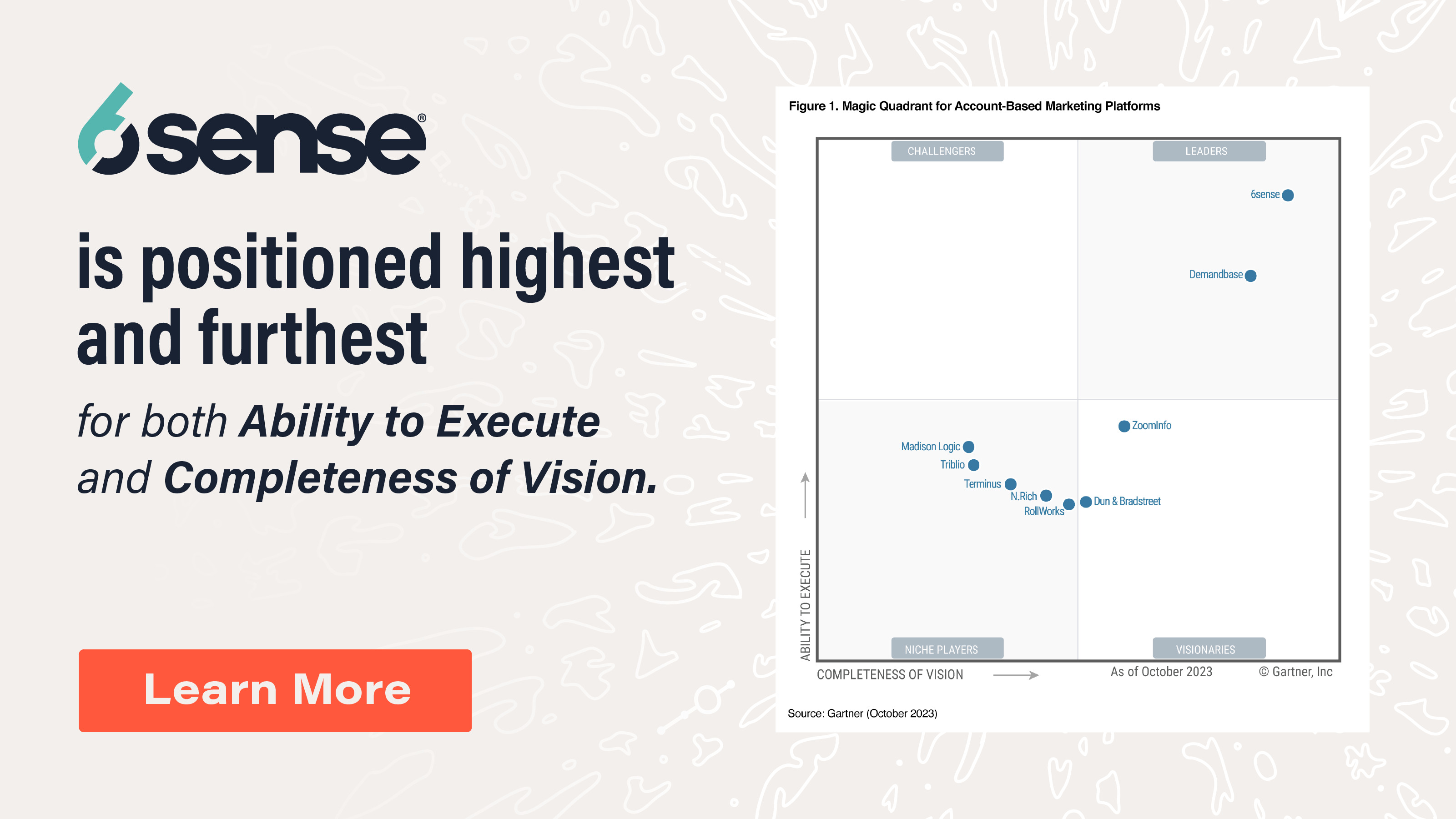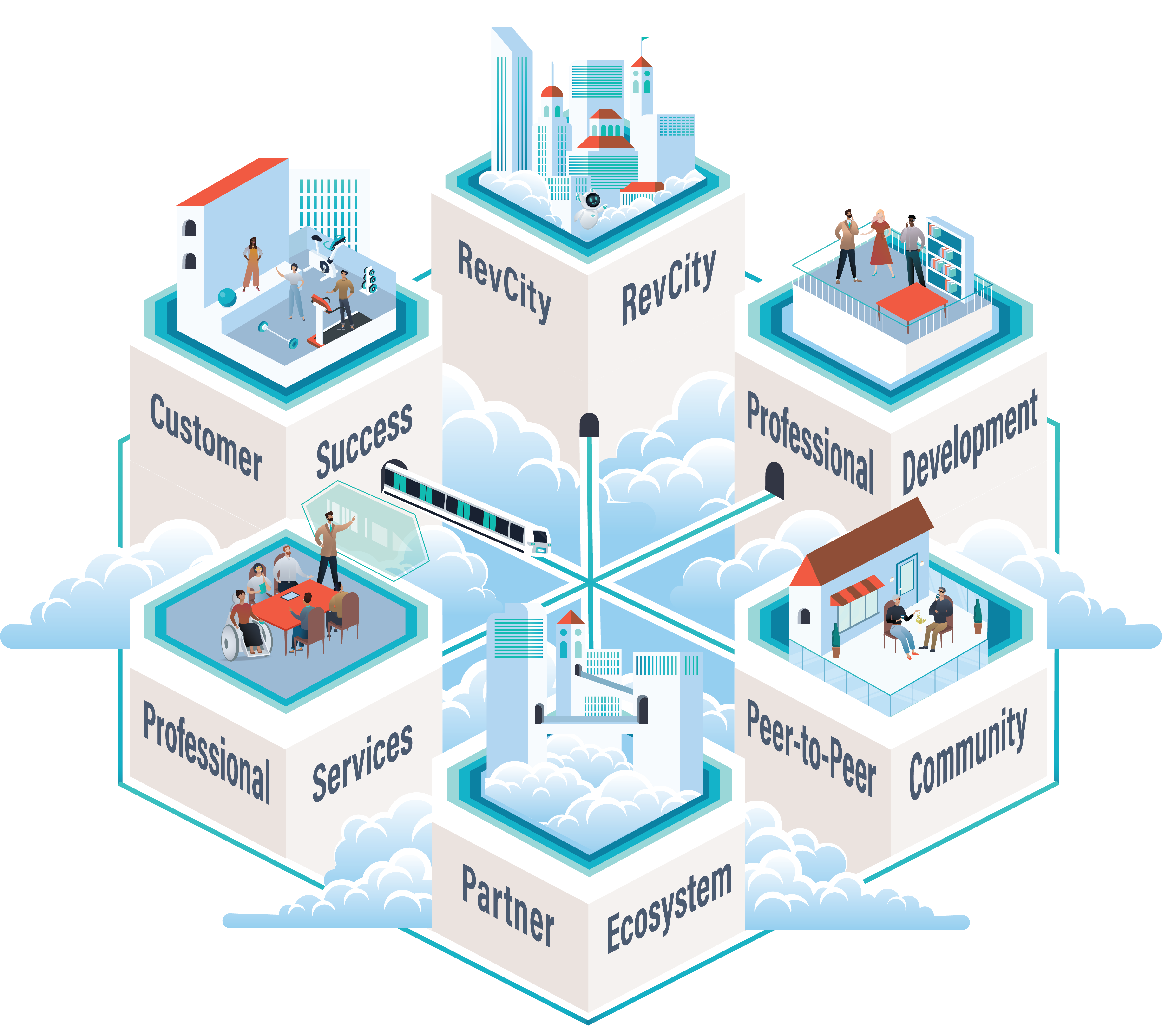Since Sean Goldie joined 6sense as our VP of Revenue Enablement & Strategy earlier this year, he’s been hard at work equipping revenue employees with the tools and strategies they need to do their best everyday. We recently sat down with him to learn more about the future he envisions for sales and revenue enablement. He described how he’s working to boost productivity and performance — and thereby enhance customer experience — at 6sense.
What drew you to 6sense?
When I was thinking about a career move, I was really focused on what kind of company I wanted to work with. I had a great run at Concur, and then at Apptio, where I had spent a ton of time with companies within the sales tech and martech stack space. I have a passion for tech tools, and wanted to find a company that was a leader in that space. 6sense was a great fit in that regard — the technology is just super cool, and it sits in my passion area, which is sales methodology and execution. There’s not a better tool to go execute with than 6sense.
So the tech definitely attracted me to 6sense. But then when I met the people, I was sold. Culture is such a buzzword, but 6sense embodies it. It’s hard to put your finger on, but you know it when you see it. The people were fantastic, and I was really excited to join the team.
How does your experience leading sales teams inform your approach to enablement here?
Well, first a little background. Apptio gave me the chance to stand up a really solid enablement function and team. I loved that team. When Vista acquired us in late 2019, I was able to spend time behind the scenes, overhauling systems and rebuilding processes. As we went through that, I had the opportunity to start an inside sales team, building a career path for junior sellers. I then jumped into revamping the SDR function.
That experience of having 30 sellers who were all in a new space and redefining what we did each and every day really drove home the need for simplicity within enablement and operations. It also made it clear that we need to truly understand what people are going through each and every day in order to help them do their best. I think of myself as a translator between marketing and sales and vice versa. This experience emphasized the need to be able to translate in simple terms. We can give sellers so much to do, but what do we really need them to execute on?
I think getting my hands back in there, having multiple leaders underneath me who were struggling with what they struggle with each and every day, cemented my internal knowledge that enablement requires simplicity. A lot of times we don’t make it simple. We’re trying to, but we don’t. And I think that last year and a half, as I jumped back into enablement full time, it gave me some empathy for those frontline leaders and the simplicity they need to successfully execute on their job.
Your approach to sales enablement goes beyond the sales team to serve the whole revenue team. Can you tell me why that’s important and how you see your role in supporting the whole organization?
If you think of the buyer’s journey and then the customer life cycle, there are so many touches along the way. And so it kind of just makes sense to enable your team to deliver well at each of those touchpoints.
That’s really what we’re trying to drive at 6sense with the revenue enablement team. We want to build a team that looks at a customer from the target stage all the way through the whole customer journey. We want to enable everyone at 6sense who is interacting with that customer, at every stage. It’s about delighting our customers and making customer interaction the most important thing for us.
We all sell technology, but at the end of the day, it’s the people behind the technology who service the customer, who interact with our customers, who really make the difference. And so my team’s goal is to make sure they’re fully equipped to do that.
You call it the revenue enablement team, not the sales enablement team. Why is that?
Revenue enablement really is enabling every revenue-facing employee — from marketers all the way through the customer success team. It’s our job to enable those folks. A field marketer comes on and they bring a whole host of expertise around marketing, but do they truly understand from day one how we want to talk to customers? Probably not.
With sales enablement, we normally think about BDRs, sales reps, account executives, account managers, and maybe the customer success organization. But there’s a whole bunch of other people within those groups, and we’re here to support them as well. Quite honestly, every single employee at 6sense, even in accounting, should be able to sit on an airplane (when we get to travel again) and be able to tell the person next to them what 6sense does.
When you think about how enablement impacts an organization, why is it important to focus so much effort on enabling leaders?
None of us can do our jobs if our frontline leader is not taken care of. If your leaders are not prepared, you can’t do your job. And the bigger a company gets, the harder it is to stay connected. So to me, our frontline leaders are our number one job in enablement. That starts with the small things like how leaders run their one-on-ones with their people every week. And it extends to how they’re growing as leaders and coaches for their teams.
Another reason it’s so important to enable our leaders is culture. When I look at how much we’re going to grow in 2021, the thing that keeps me up at night is keeping our culture sacred. And I think the best way to do that is by galvanizing that frontline group of leaders. The thing that is going to allow us to scale the most consistently and to be the most successful company we can be is that frontline leader.
How does 6sense help as a tool for your enablement efforts?
The first thing that’s required for sales enablement is a solid sales process and a solid sales methodology. That’s where 6sense fits in — it is core to a sales process. The 6QA lets us see when an in-market account is at that sweet spot between consideration and decision. And that is right where humans want to interact. Of course we also have our amazing marketing efforts, and our AI and predictive analytics, and we’re looking at intent and all that incredibly useful stuff. But at the end of the day, enablement is priming humans to have human interaction. So knowing when that sweet spot is really is transformative.
I compare it to when I started in sales and my directive was to go to Columbia Tower in downtown Seattle and just start knocking on doors. There were 64 floors. So I’d open a door and — boom, there’s a receptionist or a gatekeeper on the other side who wants nothing to do with me. And that’s where I’d start my interaction. Here at 6sense, we’re interacting with people when they are actually looking for a solution to their problem, so they’re ready to hear from us. It’s a totally different game when it comes to enabling that type of interaction.
What role do you see sales enablement playing in the future of RevTech?
Enablement has traditionally been about sales process, methodology, and training. But the enablement team of tomorrow should be about revenue performance. And that’s what I’m really aspiring to create here. It still includes the sales methodology, the sales process and how you go execute on that.
But then there’s another part, which is role-based enablement. I look at that through the lens of athletics. I talk about strength and conditioning, and fine tuning the muscle memory to get stronger each and every day. Regardless of the role that you are on the revenue team, whether you’re a BDR, a CSM, a solutions consultant, or a marketer, the enablement function makes sure you can keep getting stronger to get your specific job done well.
We recently kicked off what we call the “RevTech Revolution” with our customers and partners in the ecosystem, and at the core of it, we’re asking how we can help our revenue teams get better each and every day so they can spend most of their time interacting with customers in a very meaningful way. Enablement will play a big role in delivering that.
Part of your approach at 6sense is to shine a light on the mental components of sales enablement — both the psychological aspects of selling and the mental health of the team. Can you talk about why that’s important to you?
For years there’s been talk about mindset and sales — think back to Tony Robbins and how his mindset teaching struck such a big chord. Mindset performance has been a big topic for a while. What we’re doing at 6sense is taking all that great mindset knowledge and combining it with a focus on mental health.
Sales and marketing are super stressful, and we never really talk about it. When I started in sales selling copiers, you had 60 days or less, and if you didn’t hit your quota you were out of a job. There were no second chances. That mentality has gotten a lot looser over the years. Typically we give folks a lot more time now in sales. But this is still a stressful job.
And so we’re really going to try to tackle that first by giving the revenue team the knowledge and the ability to look at life a little bit differently on the mindset side. But we’re also bringing in support around mental health by working with a company that specializes in that, The Sales Health Alliance. We’re currently talking about rep recovery metrics and what that might mean to revenue performance, and there’s lots more to come in the future.
When you look at the RevTech Revolution, my team and I aspire to be standing right there, leading the next generation of sales enablement. That includes all the stuff that no one’s talking about — these other buckets that help an employee perform at their best. And that’s our goal.



